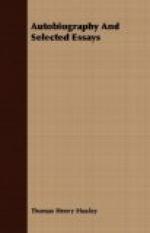Well, now, you cannot at the moment answer that kind of reasoning. You feel that your worthy friend has you somewhat at a disadvantage. You will feel perfectly convinced in your own mind, however, that you are quite right, and you say to him, “My good friend, I can only be guided by the natural probabilities of the case, and if you will be kind enough to stand aside and permit me to pass, I will go and fetch the police.” Well, we will suppose that your journey is successful, and that by good luck you meet with a policeman; that eventually the burglar is found with your property on his person, and the marks correspond to his hand and to his boots. Probably any jury would consider those facts a very good experimental verification of your hypothesis, touching the cause of the abnormal phenomena observed in your parlor, and would act accordingly.
Now, in this supposititious case, I have taken phenomena of a very common kind, in order that you might see what are the different steps in an ordinary process of reasoning, if you will only take the trouble to analyse it carefully. All the operations I have described, you will see, are involved in the mind of any man of sense in leading him to a conclusion as to the course he should take in order to make good a robbery and punish the offender. I say that you are led, in that case, to your conclusion by exactly the same train of reasoning as that which a man of science pursues when he is endeavouring to discover the origin and laws of the most occult phenomena. The process is, and always must be, the same; and precisely the same mode of reasoning was employed by Newton [90] and Laplace [91] in their endeavours to discover and define the causes of the movements of the heavenly bodies, as you, with your own common sense, would employ to detect a burglar. The only difference is, that the nature of the inquiry being more abstruse, every step has to be most carefully watched, so that there may not be a single crack or flaw in your hypothesis. A flaw or crack in many of the hypotheses of daily life may be of little or no moment as affecting the general correctness of the conclusions at which we may arrive; but, in a scientific inquiry, a fallacy, great or small, is always of importance, and is sure to be in the long run constantly productive of mischievous if not fatal results.
Do not allow yourselves to be misled by the common notion that an hypothesis is untrustworthy simply because it is an hypothesis. It is often urged, in respect to some scientific conclusion, that, after all, it is only an hypothesis. But what more have we to guide us in nine-tenths of the most important affairs of daily life than hypotheses, and often very ill-based ones? So that in science, where the evidence of an hypothesis is subjected to the most rigid examination, we may rightly pursue the same course. You may have hypotheses, and hypotheses. A man may say, if he likes, that the moon is made of green cheese: that is an hypothesis.




